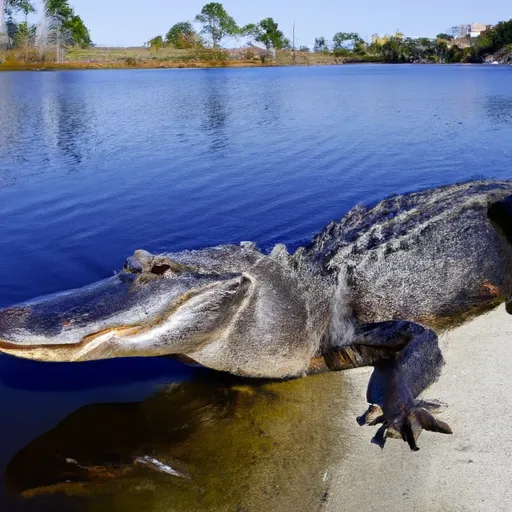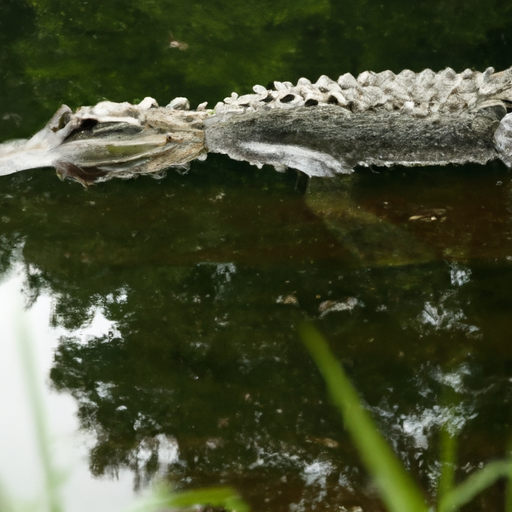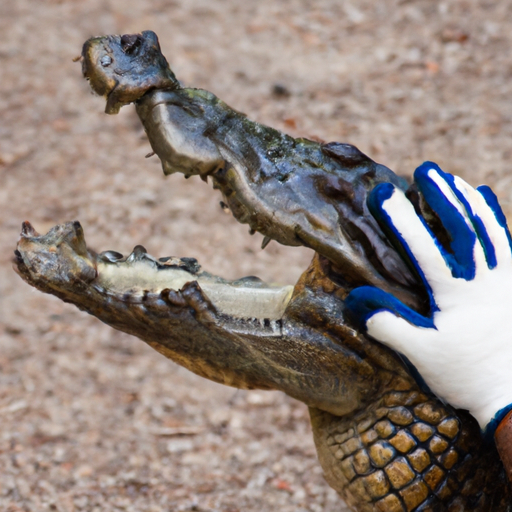Imagine strolling along the pristine beaches of Destin Florida, basking in the warm sun, when suddenly the thought strikes you: are there alligators lurking in these calm, turquoise waters?
It’s a concern that may seem far-fetched, but when it comes to the diverse wildlife of Florida, anything is possible.
In this article, we will explore whether alligators make their home in Destin Florida, uncovering the truth behind the rumors and providing you with the facts you need to know.

Overview of Destin, Florida
Welcome to Destin, Florida! Located on the Emerald Coast in the northwest part of the state, Destin is known for its stunning beaches, crystal clear waters, and abundance of outdoor recreational activities.
Whether you’re a nature enthusiast, a beach lover, or a foodie, Destin has something to offer for everyone. Let’s dive into the details of this beautiful coastal city.
Location and geography
Destin is nestled in Okaloosa County, situated on a peninsula between the Choctawhatchee Bay and the Gulf of Mexico.
The city covers an area of approximately 8.2 square miles, with a population of around 14,000 residents.
Its unique location provides visitors with access to both serene bay waters and the excitement of the Gulf.
Tourism and attractions
Destin is a popular tourist destination, attracting visitors from all over the world. The city’s main draw is its pristine beaches, with their sugary-white sand and emerald-colored water.
Besides sunbathing and swimming, tourists can engage in a wide range of water-based activities such as kayaking, paddleboarding, parasailing, and fishing.
In addition to its beautiful coastline, Destin offers a multitude of attractions for visitors to enjoy. The HarborWalk Village is a hub of entertainment, featuring shops, restaurants, and live music. The Gulfarium Marine Adventure Park provides an opportunity to see dolphins, sea lions, and other marine life up close. Golf enthusiasts can take advantage of the numerous golf courses in the area, while shoppers can explore the diverse selection of boutiques and outlets.
Wildlife and ecosystems
Destin boasts a rich diversity of wildlife and ecosystems, making it a paradise for nature lovers. The surrounding waters are home to a variety of marine life, including dolphins, sea turtles, and a wide array of fish species. The bay and nearby wetlands provide sanctuary to numerous bird species, making Destin a birdwatcher’s dream.
Additionally, the region’s ecosystems include forests, dunes, and estuaries, supporting a diverse range of flora and fauna. From coastal hammocks to salt marshes, there are numerous opportunities for visitors to explore and appreciate the natural beauty of Destin’s ecosystems.
Florida Alligators
As you immerse yourself in the beautiful natural surroundings of Destin, you may wonder about the presence of alligators in the area. Alligators are indeed native to Florida, and while they may not be as commonly associated with Destin as they are with the Everglades, they do inhabit certain parts of the region.
Habitat and distribution
Alligators in Florida typically inhabit fresh and brackish water systems, such as lakes, rivers, swamps, and marshes. While Destin itself does not have a significant number of alligators, they can be found in nearby water bodies and wetland areas, including those inland or towards the eastern parts of the Florida Panhandle.
Physical characteristics
Florida alligators are impressive creatures, reaching lengths of up to 14 feet in some cases. These large reptiles have a dark green or grayish-brown coloration with a rough, armored skin called scutes. Their strong tails and powerful jaws equipped with sharp teeth make them formidable predators.
Behavior and diet
Alligators are primarily carnivorous and will feed on a variety of prey, including fish, turtles, birds, and small mammals. They are known for their patience and ability to wait for the perfect moment to strike. Although alligators are formidable hunters, they are often more active during warmer months when temperatures are higher.
Alligators also play a crucial role in the ecosystem as part of a top-down predator-prey relationship. Their presence helps maintain a balance in the ecosystem, ensuring the population control of prey species.
Interactions with humans
While alligators are important to the ecosystem, it’s essential to exercise caution and understand their behavior to ensure both human and alligator safety.
Alligator attacks on humans are rare, but they can occur if people do not take proper precautions or venture into their habitats.
Alligator Sightings in Destin
Historical record of sightings
There have been occasional sightings of alligators in the waters and wetland areas around Destin throughout history. However, the frequency of sightings within the city limits remains relatively low.
Recent reports and encounters
In recent years, there have been a few reported sightings and encounters with alligators near Destin. These incidents are typically isolated and occur in areas where alligators are known to inhabit, such as lakes, rivers, and marshes.
It’s important to note that most of these sightings and encounters happen as a result of human activity bringing people into close proximity with alligator habitats.
Factors contributing to sightings
The limited number of sightings in Destin can be attributed to several factors. One major factor is the relatively small number of alligators in the immediate vicinity of the city. Additionally, the extensive development and population density in Destin may deter alligators from venturing into heavily urbanized areas.
However, it’s crucial to remember that alligators may still be present in surrounding bodies of water and wetland areas. Therefore, understanding how to coexist with these creatures and taking necessary precautions when near their habitats is essential.
Alligator Safety Tips
Understanding alligator behavior
It is important to have a basic understanding of alligator behavior to help ensure your safety when visiting alligator habitats. Alligators are typically more active during warmer months but can be encountered year-round. They are most active during dusk and dawn, so it’s advisable to avoid venturing into their habitats during these times.
Alligators are generally shy and will often retreat into the water when humans approach. However, it’s crucial not to approach or attempt to feed them, as this can encourage their association of humans with a food source and potentially lead to risky behavior.
Preventing encounters
The best way to prevent alligator encounters is to avoid areas where alligators are known to inhabit. Pay attention to signs or warnings posted by authorities, indicating areas where alligators may be present.
When visiting areas near water bodies or wetlands, keep a safe distance from the water’s edge. Avoid swimming or engaging in water-based activities in areas potentially inhabited by alligators. If you have pets, do not allow them to roam freely near or in the water, as they may attract an alligator’s attention.
What to do if you encounter an alligator
In the rare event of encountering an alligator, it’s important to remain calm and follow these guidelines:
- Keep your distance and never approach an alligator.
- Do not feed or provoke the alligator in any way.
- Slowly and steadily back away from the alligator, ensuring you maintain a safe distance.
- If the alligator approaches you, pick a direction and leave the area as quickly as possible.
- If you feel threatened or are unable to retreat safely, seek immediate assistance from authorities or call emergency services.
Report a sighting
If you spot an alligator in an area where its presence may pose a risk to humans or pets, it is essential to report the sighting to local wildlife authorities or animal control. This information allows wildlife agencies to monitor alligator activity and take appropriate measures to ensure public safety.
Alligator Conservation and Management
State regulations and permits
Florida has specific regulations in place regarding alligator conservation and management. The Florida Fish and Wildlife Conservation Commission (FWC) is responsible for overseeing these regulations, including the issuance of permits for alligator hunting and nuisance alligator control.
The hunting of alligators is regulated and requires a proper license and permit from the FWC. These licenses are strictly controlled to maintain sustainable populations and ensure the well-being of the species.
Role of wildlife agencies
Wildlife agencies, such as the FWC, play a crucial role in managing alligator populations and mitigating potential human-wildlife conflicts. They monitor alligator populations through various methods, including population surveys and data collection.
These agencies also provide educational resources and materials to inform the public about alligator safety, behavior, and conservation efforts. By promoting coexistence and responsible behavior, they aim to reduce the potential for negative interactions between humans and alligators.
Alligator population control methods
To keep alligator populations in check, wildlife agencies implement population control measures when necessary. This may involve capturing and relocating large alligators, as well as removing nuisance alligators that pose a threat to public safety.
By carefully monitoring alligator populations and implementing these control methods, wildlife agencies strive to strike a balance between the conservation of alligators and ensuring the safety of humans.
Frequently Asked Questions
Are alligators a common sight in Destin?
Alligators are not a common sight within the city limits of Destin. While they do inhabit certain water bodies and wetland areas near Destin, their presence is limited. It’s important to remain vigilant and take necessary precautions in areas where alligators may be present.
Are there designated alligator-watching areas in Destin?
Destin does not have designated alligator-watching areas. However, there are numerous nature reserves, state parks, and wildlife management areas in the surrounding region that offer opportunities to observe various wildlife species, including alligators. These areas provide a safe and controlled environment for experiencing the natural beauty of Florida’s ecosystems.
What precautions should tourists take in alligator habitats?
Tourists should exercise caution and respect when visiting alligator habitats. Avoid swimming or engaging in water-based activities in areas potentially inhabited by alligators. Keep a safe distance from the water’s edge and follow any signage or warnings indicating the presence of alligators. It’s also important not to approach or feed alligators, as this can lead to risky behavior.
Can alligator attacks be prevented?
While alligator attacks on humans are rare, taking proper precautions significantly reduces the risk of encounters. By avoiding alligator habitats, keeping a safe distance, and understanding alligator behavior, visitors can minimize the likelihood of incidents. Paying attention to public safety guidelines and remaining vigilant is key to prevention.
What should I do if I encounter an alligator?
In the rare event of encountering an alligator, it’s crucial to remain calm, maintain a safe distance, and slowly back away. Do not approach, feed, or provoke the alligator. If necessary, retreat to a safe location and seek immediate assistance from authorities. It’s essential to prioritize your safety and the safety of others.
Local Alligator Conservation Efforts
Educational programs and initiatives
Local organizations and wildlife agencies in the Destin area actively engage in educational programs and initiatives to promote alligator conservation. These programs aim to raise awareness about alligators, their importance in the ecosystem, and how to coexist with them safely.
Educational initiatives may include workshops, presentations, and outreach programs in schools, community centers, and public events. By providing accurate information and dispelling myths, these efforts enable the public to better understand and appreciate alligators.
Alligator research and monitoring
Ongoing research and monitoring projects contribute to the understanding of alligator populations and behaviors in the region. Through population surveys, tracking, and data collection, scientists and researchers gather valuable information essential for effective conservation and management strategies.
These research efforts serve as the foundation for the development of best practices in alligator conservation and contribute to broader scientific knowledge about this iconic species.
Conservation partnerships
Local conservation organizations often collaborate with wildlife agencies and other stakeholders to implement effective conservation strategies. These partnerships help leverage resources, expertise, and community support, leading to more comprehensive conservation efforts.
By working together, these organizations strive to protect alligator habitats, raise awareness, and ensure the long-term survival of these captivating reptiles.
Other Wildlife in Destin
Marine life
Aside from alligators, Destin is teeming with a diverse range of marine life. The Gulf of Mexico supports an abundance of fish species, such as redfish, snapper, grouper, and flounder. Dolphins, sea turtles, and various shark species are also frequently spotted in the Gulf waters.
Snorkeling or scuba diving provides an opportunity to explore vibrant coral reefs and encounter fascinating sea creatures. The marine biodiversity in Destin creates an unforgettable experience for nature enthusiasts and those with a passion for underwater exploration.
Birds and avian species
Destin’s wetlands and coastal areas attract a wide variety of bird species, making it a haven for birdwatchers. From elegant herons and pelicans to colorful warblers and sandpipers, there is an abundance of avian life to discover.
Several nature parks and reserves offer birdwatching opportunities, allowing visitors to observe these winged wonders in their natural habitats. The sights and sounds of the birds are a testament to the ecological richness of Destin.
Endangered species
Destin and its surrounding areas are home to several endangered species that rely on the region’s unique ecosystems for survival. Some of these endangered species include the Okaloosa darter, beach mouse, and sea turtles.
Efforts are underway to protect and conserve these species, with strict regulations in place to ensure their well-being. As visitors to Destin, it’s crucial to respect these conservation efforts and help preserve the natural habitats these endangered species depend upon.
Destin’s Safety and Emergency Services
Emergency response systems
Destin has a comprehensive emergency response system in place to ensure the safety and well-being of both residents and visitors. In case of emergency, dialing 911 will connect you to the appropriate emergency services, including police, fire, and medical assistance.
It’s always a good idea to familiarize yourself with the local emergency contact numbers and know the location of the nearest medical facilities during your stay in Destin.
Animal control services
The city of Destin has animal control services in place to handle various wildlife-related issues, including those involving alligators. Animal control authorities are responsible for responding to reports of alligator sightings or encounters and taking appropriate measures to ensure public safety.
If you encounter an alligator within the city limits, it is recommended to contact the local animal control agency or non-emergency police line for assistance.
Public safety guidelines
To ensure the safety of residents and tourists, Destin has established public safety guidelines that cover a range of topics, including interactions with wildlife.
These guidelines may include specific regulations pertaining to alligator safety and the importance of respecting their habitats.
By adhering to the public safety guidelines, individuals can have a safe and enjoyable experience while visiting Destin and its surrounding areas.
Final Thoughts
Destin, Florida, offers a captivating blend of natural beauty, outdoor adventures, and unique wildlife.
While alligators may not be as prevalent in Destin as they are in other parts of Florida, their presence in nearby water bodies and wetland areas should not be overlooked.
By understanding alligator behavior, taking necessary precautions, and respecting their habitats, visitors to Destin can coexist with these incredible reptiles safely.
Remember, it’s crucial to report alligator sightings or encounters to local wildlife agencies or animal control to help ensure the ongoing conservation and management of these iconic creatures.
As you explore the wonders of Destin and its diverse ecosystems, be sure to appreciate the other wildlife species that call this beautiful coastal city home.
From marine life to avian species, Destin’s natural habitats are filled with awe-inspiring creatures, creating a harmonious environment where humans and wildlife can thrive together.



